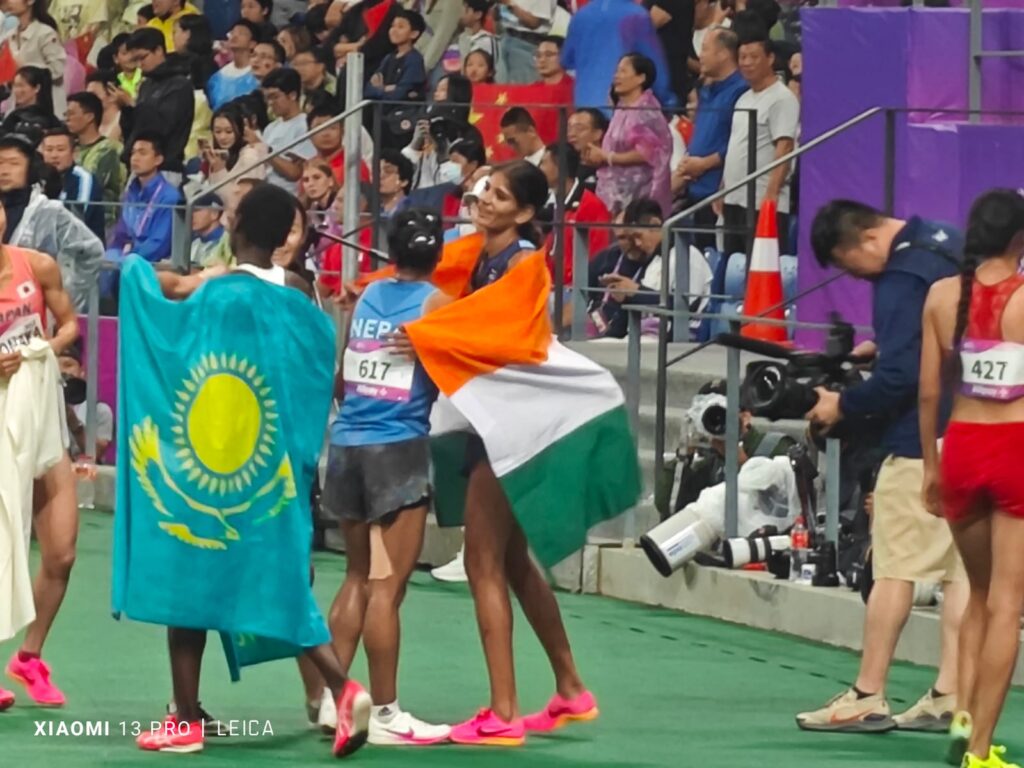Parul Chaudhary ran into the history books with one of the most epic final laps in the history of Indian athletics. Judged on personal bests, Parul was no match for a handful of African runners now competing under other flags. But in a slow and tactical women’s 5000m run in oppressive humidity, she ran an unbelievable final 100m to reel in Japan’s Ririka Hironaka, who looked to have the race won when she streaked away down the back straight.
Hironaka was one of three women in the field who had run the distance in less than 15 minutes. Of those, Caroline Kipkirui and Daisy Jepkemei – both representing Kazakhstan, but schooled in the unmatched Kenyan long-distance running tradition – had personal bests that were 42 and 24 seconds faster than Parul’s, while Hironaka had run the distance 17 seconds faster. Such gaps are not supposed to be bridged in the real world. Sport, as we know, seldom imitates reel life.
The slow pace, however, suited both Parul and Ankita, her teammate, who stayed with the leading bunch right up until Ankita dropped off the pace with a lap and a half to go. But when Hironaka surged, Parul stayed with her, and it became obvious that the others were competing for bronze. Hironaka appeared to finish stronger, but Parul found a second, third and fourth wind on the home straight to surge past with her final strides.
In her mind, there was more than a gold medal at stake. “I’m feeling great,” she said in the mixed zone after the race. “In UP [Uttar Pradesh, the state she hails from], the policy is if you don’t get a gold medal, you don’t get a direct DSP [Deputy Superintendent of Police] job. It was in my mind, and yesterday night, I had a chat with my mother regarding that. Currently, I’m working as a TE [Ticket Examiner] in the railways, but with this gold, I think I’ll get a DSP position now.”
Who would even think of denying her that after this run for the ages? “I knew I could take over in the last few metres,” she said. “Yesterday, I missed the gold in [the 3000m] Steeplechase, but today I had it planned. I only slept for three hours after yesterday’s race, thinking about today. I thank the AFI [Athletics Federation of India] and SAI [Sports Authority of India] for all the support.”
It would be churlish to criticise Hironaka for going too early, or of complacency once she sprinted clear. Scott Stevens, who coaches Parul, certainly wasn’t about to. “I think this was Parul’s extra gear,” he said. “They both were going for gold. Parul just had the finishing kick. And it was a part of the strategy. We develop this in training for the 5000m, to give this extra kick at the last.”
Starting with Sunita Rani in Bangkok in 1998, India had won a medal in this event in four straight games, before drawing a blank in 2014 and 2018. With the influx of athletes from Kenya and Ethiopia, representing both Middle Eastern states and Central Asian republics, the chances of a medal seemed even more remote this time. But what Parul proved was that there are forces at work that can bridge seemingly insurmountable gaps. In this case, it may have been the desire for a more satisfying job and a better life. Whatever it was, it gave her wings as she flew down that final straight. Right into the history books.




